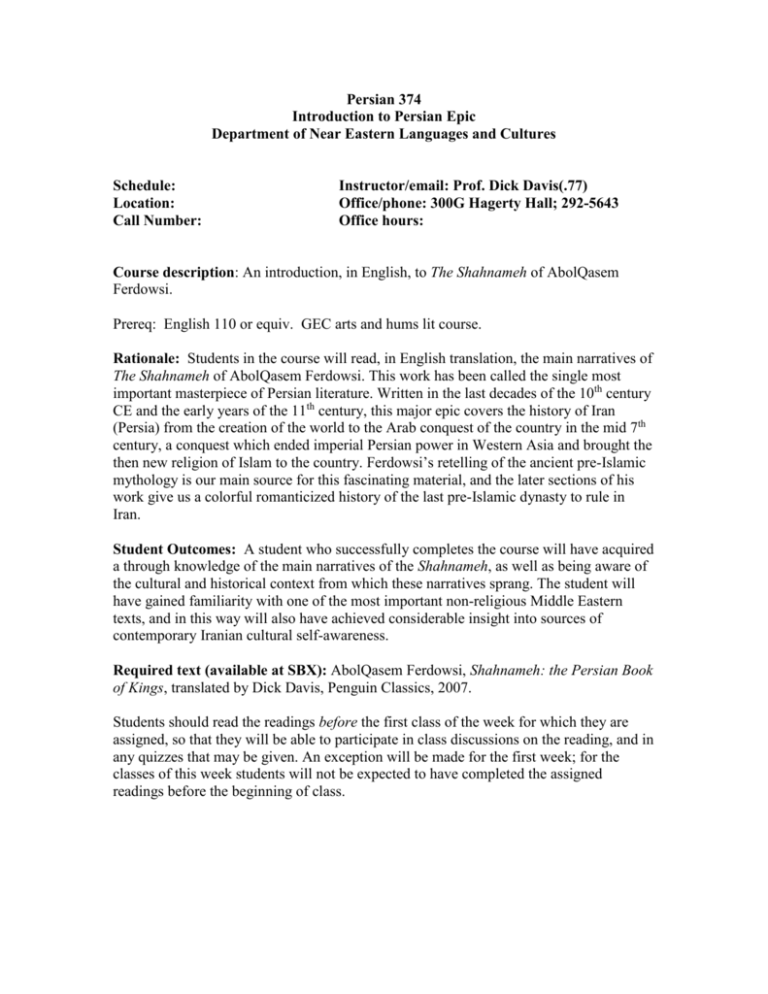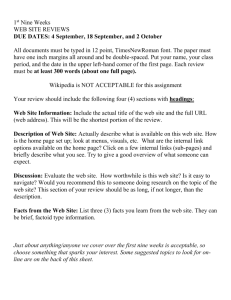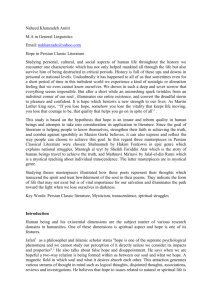Persian 374 Syllabus
advertisement

Persian 374 Introduction to Persian Epic Department of Near Eastern Languages and Cultures Schedule: Location: Call Number: Instructor/email: Prof. Dick Davis(.77) Office/phone: 300G Hagerty Hall; 292-5643 Office hours: Course description: An introduction, in English, to The Shahnameh of AbolQasem Ferdowsi. Prereq: English 110 or equiv. GEC arts and hums lit course. Rationale: Students in the course will read, in English translation, the main narratives of The Shahnameh of AbolQasem Ferdowsi. This work has been called the single most important masterpiece of Persian literature. Written in the last decades of the 10th century CE and the early years of the 11th century, this major epic covers the history of Iran (Persia) from the creation of the world to the Arab conquest of the country in the mid 7th century, a conquest which ended imperial Persian power in Western Asia and brought the then new religion of Islam to the country. Ferdowsi’s retelling of the ancient pre-Islamic mythology is our main source for this fascinating material, and the later sections of his work give us a colorful romanticized history of the last pre-Islamic dynasty to rule in Iran. Student Outcomes: A student who successfully completes the course will have acquired a through knowledge of the main narratives of the Shahnameh, as well as being aware of the cultural and historical context from which these narratives sprang. The student will have gained familiarity with one of the most important non-religious Middle Eastern texts, and in this way will also have achieved considerable insight into sources of contemporary Iranian cultural self-awareness. Required text (available at SBX): AbolQasem Ferdowsi, Shahnameh: the Persian Book of Kings, translated by Dick Davis, Penguin Classics, 2007. Students should read the readings before the first class of the week for which they are assigned, so that they will be able to participate in class discussions on the reading, and in any quizzes that may be given. An exception will be made for the first week; for the classes of this week students will not be expected to have completed the assigned readings before the beginning of class. 2 SYLLABUS Week 1. Introduction. Ferdowsi’s world and times; his sources. The divisions of the poem (mythological, legendary, historical). Its major themes. About this translation. Readings: Shahnameh, pp.xiii –xxxvii. Week 2. The mythological Shahnameh. Readings: Shahnameh, pp. 1 – 103. Week 3. The legendary Shahnameh. The early tales of Rostam. Readings: Shahnameh, pp.105 - 186. Week 4. The legendary Shahnameh continued. “Fathers and Sons”. Readings: Shahnameh, pp. 187 – 279. Week 5. The legendary Shahnameh continued. “Fathers and Sons” continued. Readings: Shahnameh, pp. 347 - 439. Week 6. The legendary Shahnameh continued. The Akvan Div; Bizhan andManizheh. Readings: Shahnameh, pp. 299 - 345. MIDTERM Week 7. The historical Shahnameh. Darab, Dara, and Eskandar. Readings: Shahnameh, pp.441. – 528. Week 8. The historical Shahnameh continued. The Ashkanians, Ardeshir. Readings: Shahnameh, pp.529 – 576. Bahram Gur, Shahnameh, pp.622-684. Week 9, The historical Shahnameh continued. Bahram Chubineh, Shahnameh pp.727797. The last stories and the Arab Conquest. Readings: Shahnameh, pp. 826 – 854. Week 10. The Shahnameh and the visual culture of Iran. Review. Student evaluation Class participation will be encouraged throughout the course. In addition, there will be four quizzes given every other week, a midterm, and a final. Class participation Quizzes Midterm Final 15% 20% 30% 35% 3 Academic Misconduct Policy: It is the responsibility of the Committee on Academic Misconduct to investigate or establish procedures for the investigation of all reported cases of student academic misconduct. The term “academic misconduct” includes all forms of student academic misconduct wherever committed; illustrated by, but not limited to, cases of plagiarism and dishonest practices in connection with examinations. Instructors shall report all instances of alleged academic misconduct to the committee (Faculty Rule 3335-5-487). For additional information, see the Code of Student Conduct (http://studentaffairs.osu.edu/info_for_students/csc.asp). Disability Services Policy: Students with disabilities that have been certified by the Office for Disability Services will be appropriately accommodated, and should inform the instructor as soon as possible of their needs. The Office for Disability Services is located in 150 Pomerene Hall, 1760 Neil Avenue; telephone 292-3307, TDD 292-0901; http://www.ods.ohiostate.edu.








